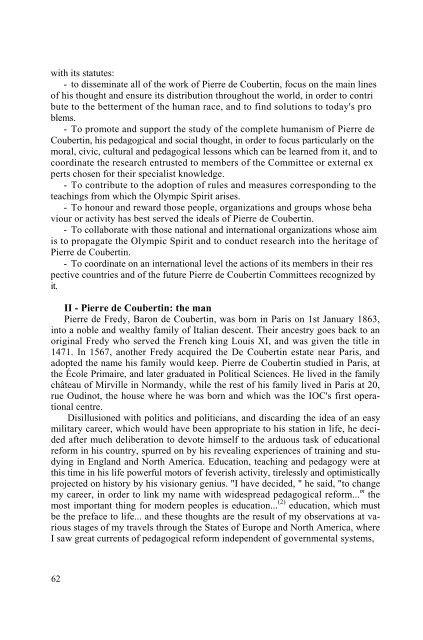Create successful ePaper yourself
Turn your PDF publications into a flip-book with our unique Google optimized e-Paper software.
with its statutes:<br />
- to disseminate all of the work of Pierre de Coubertin, focus on the main lines<br />
of his thought and ensure its distribution throughout the world, in order to contri<br />
bute to the betterment of the human race, and to find solutions to today's pro<br />
blems.<br />
- To promote and support the study of the complete humanism of Pierre de<br />
Coubertin, his pedagogical and social thought, in order to focus particularly on the<br />
moral, civic, cultural and pedagogical lessons which can be learned from it, and to<br />
coordinate the research entrusted to members of the Committee or external ex<br />
perts chosen for their specialist knowledge.<br />
- To contribute to the adoption of rules and measures corresponding to the<br />
teachings from which the Olympic Spirit arises.<br />
- To honour and reward those people, organizations and groups whose beha<br />
viour or activity has best served the ideals of Pierre de Coubertin.<br />
- To collaborate with those national and international organizations whose aim<br />
is to propagate the Olympic Spirit and to conduct research into the heritage of<br />
Pierre de Coubertin.<br />
- To coordinate on an international level the actions of its members in their res<br />
pective countries and of the future Pierre de Coubertin Committees recognized by<br />
it.<br />
II - Pierre de Coubertin: the man<br />
Pierre de Fredy, Baron de Coubertin, was born in Paris on 1st January 1863,<br />
into a noble and wealthy family of Italian descent. Their ancestry goes back to an<br />
original Fredy who served the French king Louis XI, and was given the title in<br />
1471. In 1567, another Fredy acquired the De Coubertin estate near Paris, and<br />
adopted the name his family would keep. Pierre de Coubertin studied in Paris, at<br />
the École Primaire, and later graduated in Political Sciences. He lived in the family<br />
château of Mirville in Normandy, while the rest of his family lived in Paris at 20,<br />
rue Oudinot, the house where he was born and which was the IOC's first operational<br />
centre.<br />
Disillusioned with politics and politicians, and discarding the idea of an easy<br />
military career, which would have been appropriate to his station in life, he decided<br />
after much deliberation to devote himself to the arduous task of educational<br />
reform in his country, spurred on by his revealing experiences of training and studying<br />
in England and North America. Education, teaching and pedagogy were at<br />
this time in his life powerful motors of feverish activity, tirelessly and optimistically<br />
projected on history by his visionary genius. "I have decided, " he said, "to change<br />
my career, in order to link my name with widespread pedagogical reform... m the<br />
most important thing for modern peoples is education... (2) education, which must<br />
be the preface to life... and these thoughts are the result of my observations at various<br />
stages of my travels through the States of Europe and North America, where<br />
I saw great currents of pedagogical reform independent of governmental systems,<br />
62

















